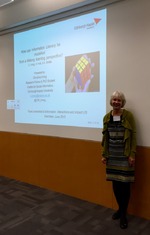Information literacy in Scotland: making it mainstream
 Thursday, July 23, 2015 at 8:24AM
Thursday, July 23, 2015 at 8:24AM The work of the Community of Practice aand specifically the featured in CILIP Update last month (June 2015). The article Information literacy in Scotland: making it mainstream explained how the Community of Practice (CoP) The Right Information: Information skills for the 21st Century Scotland is bringing together information professionals and representatives from other professions to promote information literacy as a national policy issue in Scotland.
The article by John Crawford, myself (Christine Irving) and Lauren Smith provides some background information on the CoP and it's engagement in the:
- Royal Society of Edinburgh's report Spreading the Benefits of Difital Participation
- Cross Party Group on Digital Participation at the Scottish Government
How the CoP works closely with the Scottish Library and Information Council (SLIC) and CILIPS to advise them and to promote information literacy. More recently working with the Scottish Council for Vountary Organisations (SCVO) on Digital Participation including information literacy in their training agenda.
The main body of the article reported on the information literacy symposium held in Glasgow on the 13th February 2015. The aim of the symposium was to bring information professionals and representatives from other professions together to promote information literacy as a national policy issue in Scotland. The event was very successful.
To read all about the event see Information literacy in Scotland: making it mainstream
Dorothy Williams attended the event and wrote a piece for the Journal of Information Literacy Information literacy in Scotland: challenges and opportunities. In her piece Dorothy identified that the main issues were "digital participation agendas and the need for strategies to overcome digital exclusion". The
clear message coming from all speakers was the need for partnership working and that librarians and libraries needed to be central to those partnerships. Real progress in digital literacy or IL development needed collaboration and communication across sectors, as well as identification of areas of common interest.
She identified a number of issues and dilemmas which emerged during plenary and group discussions. However said that:
Despite these concerns the tone of the day was positive and the event enabled sharing and communication of ideas, establishment of new cross-sector contacts and an opportunity to press forward the joint message to Government of the value and importance of information literacy.
As you would expect it is a good piece from Dorothy.
 IL symposium 2015,
IL symposium 2015,  JIL,
JIL,  UPDATE,
UPDATE,  articles in
articles in  Cross sector
Cross sector 

